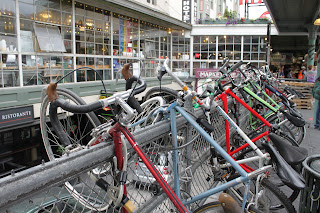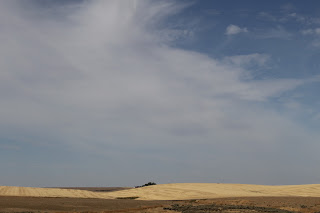Two excellent editorials appeared this March, paying homage
to the end of the made-from-trees version of Encyclopedia Britannica.
For anyone who remembers spending lazy childhood days
with their nose in an encyclopedia, the following two editorials will strike an
emotional cord. But not only that, the two authors share, I believe, accurate
perceptions on the current state of information retrieval which often does not
lead to wisdom in the minds of the retrievers.
I begin with Alfred P. Doblin’s piece, “Before Wikipedia, We
Sang ‘Rule Britannica,'” which appeared in The Record, part of the North Jersey
Media Group, March 16, 2012. Doblin writes:
“What I lament is that the poetry of grand thought – and it
is poetry – has been replaced by the quick clicks of random pieces of
information. Instant facts do not make for instant analysis. Instant analysis
is an oxymoron. The laborious process of research affords someone the needed
time to digest multiple sources of information, discern what is valid and, in
some cases, accurate, and come to a reasoned conclusion.
Too easily online, what poses as thought is merely reaction.
We have created a society of Pavlov’s dogs reflexively moving and twitching to
outside stimuli.” Alfred P. Doblin
Note Doblin’s advocacy of “multiple sources of information.”
The Britannica is neither liberal nor conservative. The problem with online
fact or opinion sourcing is that the internet allows us the choice to visit only
like-minded websites, Facebook pages and news sources, including gossip sites that pose as
news. And this one-sided diet on everything, day in and day out, is a dangerous
way to feed oneself. How can one ever be wrong or mistaken if one never gets
the truth, but only an agenda-plagued version of the story?
Doblin continues:
“The print edition of the Encyclopedia Britannica gave an
overview that made the longer journey possible. Too many people go no further
than Wikipedia. And if they do, it is to TMZ. Intellectual curiosity is
discouraged. We all may have the world at our fingertips if we have a broadband
connection and a good computer, but our fingers are not the part of the anatomy
that thinks.
Our national conversation is a reflection of this:
Simplistic questions about complex issues, as if a Google search engine can
find the meaning of life. And so the responses are equally simplistic. “ Alfred
P. Doblin
Read the entire op-ed here:
Ask any teacher in America if student attention spans are growing
shorter. What does this mean for well researched, thought out and considered
answers to questions? What will happen to the notion and practice of “looking
at both sides of an issue?”
As a journalist friend of mine once responded, when I asked
what had happened to journalistic writing that objectively answers the Who, What, Where,
When and Why questions (as I was taught), “nobody does that anymore!” Scary.
Let’s move on to the delightful March 19, 2012 op-ed
by Alexandra Petri of The Washington Post, titled, “In Era of Instant Data
Retrieval, a Bastion of Knowledge Folds.” Petri writes:
“There’s a curious void, and we’ve filled it with Thoughts
About Ourselves. No wonder we spend more time on Facebook than Google. Why
learn about anything else? Why stare beyond? Someone in the 16th
century already did, and, wouldn’t you know, Wikipedia’s all over it.
Once, people had the nagging suspicion that everything you
could possibly think had already been thought. Now, with Google suggesting
things before we think them and Wikipedia supplying answers to our every
question, we don’t have to suspect.” Alexandra Petri
Read her op-ed here. You won't be disappointed!
One other person has provided a post-mortem on the book-set
encyclopedia: Paul Reuter, Editorial Director of Convenience Store/Petroleum
magazine, a copy of which I picked up at a recent coffee tradeshow. Reuter, who
cites the Doblin article, asks, “Is everyone entitled to the same platform?
Does a politician have equal standing with a heart surgeon when talking about
medical procedures? Does a patron carry equal credibility when talking taste
with a French chef?”
These are excellent questions, far-removed, perhaps, from
the news that the Encyclopaedia Britannica is going out of print after 244
years (will still be online. But will people bother?) One thing this instant
access to “information” has done, at times, is give people false empowerment.
Which leads to pride. A friend of mine once made the comment that “everyone’s
an expert on nothin’.”
Reuter writes, “What we mostly have today is instant
reaction. I hear something, perhaps check out a couple of websites, and then
form my opinion. That is not analysis or analytical thinking.” Paul Reuter
I once canceled an online subscription to what promoted
itself as a Christian news source. As I read the supposed “news” stories,
which, to my trained journalistic ear should entail “objectivity” (where all
the facts are presented to speak for themselves and the reader is allowed to
make up their own mind), I quickly realized much of the news was slanted. (I took the time to compare the stories to several other news outlets, including Associated Press, and found, in the Christian news stories, editorializing where there should not be and many facts left out entirely). If
one cannot make a case honestly, then one is not a confident person of
integrity. If we feel the means (misrepresenting or not revealing accurate
facts) justify the end, what kind of end are we going for? Precisely
one that can’t stand on its own two feet because it has been tainted in the
getting there.
And that is what happens on the Internet all the time.
Which is why I am glad the Encyclopaedia Britannica will
continue online, albeit for a fee, as it is much needed. Only time will tell if
people are willing to pay for information that has proved itself trustworthy for
244 years.
“Wisdom is found on the lips of the discerning…” Proverbs
10:13
“Wise men store up knowledge, but the mouth of a fool
invites ruin.” Proverbs 10:14
“For the time will come when men will not put up with sound
doctrine. Instead, to suit their own desires, they will gather around them a
great number of teachers to say what their itching ears want to hear. They will
turn their ears away from the truth and turn aside to myths.” 2 Timothy 4:3-4

















